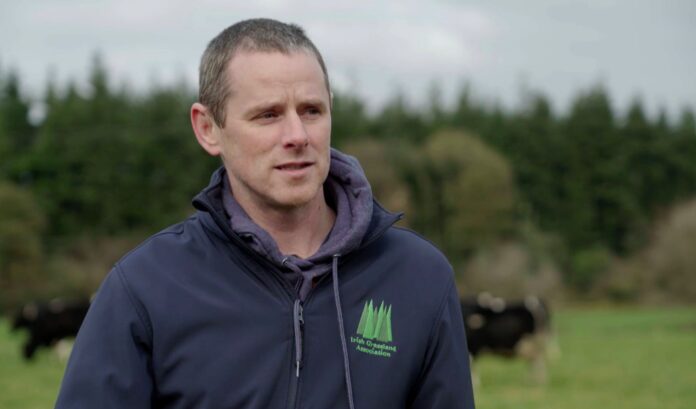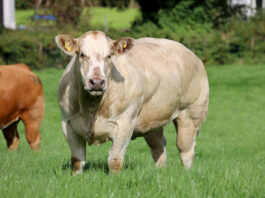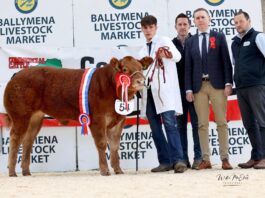Over a decade ago, John Kelly began dairying on his family-run 400-ac farm, which sits on the banks of the River Slaney and was purchased by his parents 29 years ago.
He now milks 240 cows on the enterprise, which is based near Baltinglass, County Wicklow and was “a very different scene with no milking parlour and no roadways up until 2012”.
Dairy farming
Appearing in the fourteen episode of the 2023 series of RTÉ’s Ear to the Ground, Kelly, explained to presenter, Ella McSweeney how his journey as a sheep and tillage farmer turned dairy farmer began:
“I have a good friend in the north, and I went to his discussion group. They put up the net margin of cows where I saw the difference and knew I could not get anywhere near that with sheep.”
“That is when the penny dropped for me that I could work at something very similar and make a multiple of the income.”
“I remember at the time; there was around €50/ewe of a gross margin. I remember the net figure they put up for cows was over €2,000/ha.”
“Cows have given us financial security, options for succession and have enabled us to employ people, so dairying has brought a lot to our family.”
Kelly outlined that when he began his journey in dairying, conversations centred around technical efficiency, production and targets, “which we set, and if you were not achieving those, you had to look at your system”.
“There was no word about water quality or emissions. We were pushed towards intensifying and produced a lot of product, and now, it is like, ‘woh, lads, no, we will go back the way; we cannot do that, and we are not sure how far back we have to go’.”
“Farmers built their systems around that, and I think it has caught a lot of farmers,” he told viewers.
Ag emissions
According to the EPA – Environmental Protection Agency – dairy expansion is a driver of increased emissions, as it expressed in this news article (increase in milk production – 5.5% and higher dairy cow numbers – 2.8 -) McSweeney added.
Figures from the ICBF (Irish Cattle Breeding Federation) show that over the past ten years, the number of dairy cows in Ireland has increased by 40% to 1.6 million animals.
According to the CSO, between 2021 and 2022, the number of dairy cows rose by 22,800 animals, an increase of 1.4%.
In July 2023, as widely reported by That’s Farming, the Irish government announced a need for a 25% cut in GHG emissions from ag by 2030, compared to 2018 levels.
Change
Kelly believes that “change needs to happen” and said that “putting our head in the sand and defending the way we farm, when the way we farm has produced the environmental issues that we have, we cannot shy away from that either.”
“Will it bring benefits for us, the environment and the public, farming the way we are farming? The answer is probably no.”
“There will be more pressure on us with stocking rates and water quality; those are the main issues that we face.”
“A lot of the arguments are about efficiencies; our cows are more efficient, we can produce more per kg and all that, but unless we can solve the environmental stuff, we are really just ignoring what is ahead.”
McSweeney asked if step number one means no more expansion, and he replied: “Yes – but it is hard for farmers because we came from a no quota era”.
“I was lucky enough for that to free up, and the dairy industry has been really good to us. So what you are saying is that if there is no expansion, all dairy farmers are stuck in time.”
“We are just frozen. If you think it through logically, if we are going to get a reduction in carbon and methane, you cannot do it by expanding.”
New approach
He believes that a new approach is needed to fundamentally address the impact of dairy farming on the environment, something that is in the farmer’s own interest.
He is of the view that dairy farmers need to take the opportunity to be “more involved”.
“I think there are a lot of apprehensive farmers out there that are scared of what is coming and do not understand why it is coming; they do not see any issues with what they have.”
“There is a lot of misunderstanding out there. We have not had an honest discussion amongst ourselves; I do not think.”
“If you are too busy defending, you cannot step back and see what the real issues are. They are not hidden issues anymore; they are out in front of mainstream press and media. We are not partaking in that discussion at all; well, it does not feel like it.”
“The public still supports us. Obviously, there is just a disconnect there, but we are like everyone else in that we are trying to do the best.”
“We have made mistakes, but I think we can correct our course with a little bit of guidance. We need to take control of it because we have totally lost control of it, I think,” he concluded.



